 One hundred years ago today, August 20, 1914, Pope St. Pius X died. The so-called “War to end all Wars” had ignited less than a month previously, and just two months after the Sarajevo assassination of Austrian archduke Ferdinand. With a hundred years hindsight, we see anew just how influential that conflagration really was. Ethnic and religious tensions since 1991 in Bosnia, Kosovo, Ukraine, and even Syria and Afghanistan can find their roots directly, more or less, in the “Great War.” Pius died watching the world he and the rest of world had known begin to crumble.
One hundred years ago today, August 20, 1914, Pope St. Pius X died. The so-called “War to end all Wars” had ignited less than a month previously, and just two months after the Sarajevo assassination of Austrian archduke Ferdinand. With a hundred years hindsight, we see anew just how influential that conflagration really was. Ethnic and religious tensions since 1991 in Bosnia, Kosovo, Ukraine, and even Syria and Afghanistan can find their roots directly, more or less, in the “Great War.” Pius died watching the world he and the rest of world had known begin to crumble.
A gloomy consideration, to be sure. It is worth noting that Pius X, when his pontificate began, realized that such an end was quite possible. His first encyclical, E Supremi, set out the framework for his papal motto: “Instaurare Omnia in Christo” (to renew all things in Christ). After stating his unworthiness for the papacy, especially having to follow Pope Leo XIII who had reigned for twenty-six years, Pius declared his pontificate would serve God, not earthly partisanship (#4). The odds, Pius admitted, did not look promising. Even in 1903 he saw the pursuit of peace rendered fruitless due to the secular dismissal of religion (#7). Nevertheless, committed to bringing humanity back to God, Pius stated flatly: “Now the way to reach Christ is not hard to find: it is the Church. “(#9) Renewing all things in Christ thus meant the Church needed to get its own act together. Pius then encourages bishops to rekindle pastoral vigor among the clergy while nurturing seminary education. It started, he claimed, with holiness (#11). Secure that first, and then theological and moral rectitude would fall into line. Furthermore, religious instruction of the laity and those outside the Church depended on this proper spiritual orientation.
Pius’ focus might appear strikingly different from our modern view. After all, think of the reminders—and justifiably so!—to consider the plight of the poor. A glimpse at the Catechism #773 indicates the Church has not strayed far. The Church’s Marian charism—an inward holiness and purity—necessarily precedes the Church’s Petrine charism of external authority and leadership. (And thus, here at his pontificate’s beginning, lie the foundations for Pius’ better-known efforts to purify the Church, which these days tend to be viewed as intrusive thought-control.) Furthermore, St. Pius X himself recognized that, as one of my French-Canadian in-laws said, honey attracts more flies than vinegar. “… it is vain to hope to attract souls to God by a bitter zeal. On the contrary, harm is done more often than good by taunting men harshly with their faults, and reproving their vices with asperity.” (E Supremi #13—and here Pius cited I Kings 19, the Old Testament reading for August 10) With that in mind, Pius X wanted Catholic action—yes, a group so-named but more importantly Catholics actually doing something to bring about the renewal his pontificate sought.
For truly it is of little avail to discuss questions with nice subtlety, or to discourse eloquently of rights and duties, when all this is unconnected with practice. The times we live in demand action – but action which consists entirely in observing with fidelity and zeal the divine laws and the precepts of the Church, in the frank and open profession of religion, in the exercise of every kind of charitable works, without regard to self-interest or worldly advantage. (#14)
Quite frankly, this might be why theologians and others preoccupied with an “academic apostolate” find St. Pius X discomforting. Don’t just stand there—do something, for God’s sake! (literally!)
One hundred years later, though, we actually like to hear such injunctions. We continue to enjoy “the Francis effect.” Pope Francis’ recent trip to South Korea met, not surprisingly, with glowing accolades. Vatican insider John L. Allen, Jr. now calls Francis “a truly global papacy” and rightfully so. But at least some of the foundations for the world’s current Francis enthusiasm lay a century ago with a saintly pope that we too often remember quite differently.
Guest blogger Jeffrey Marlett blogs at Spiritual Diabetes.

Hi Dr. Marlett: Great article! Nicely stated. We need to put our faith into practice. We need to “Do something, for God’s sake.” I also believe that we can attract more souls with honey (be the living example of holiness) than with vinegar (fire and brimstone; holier than thou attitudes). Your article gives me the affirmation I needed regarding my approach for blogging about the virtues, using “honey;” that it is the right way to approach people. – Peace, Ginny